You must call your child's doctor as soon as you notice any symptoms of dehydration in your baby, as things can become serious quickly.
When Can Babies Drink Water?
By: Suzanne Renee' - Updated April 26, 2024 - 8 Minute Read
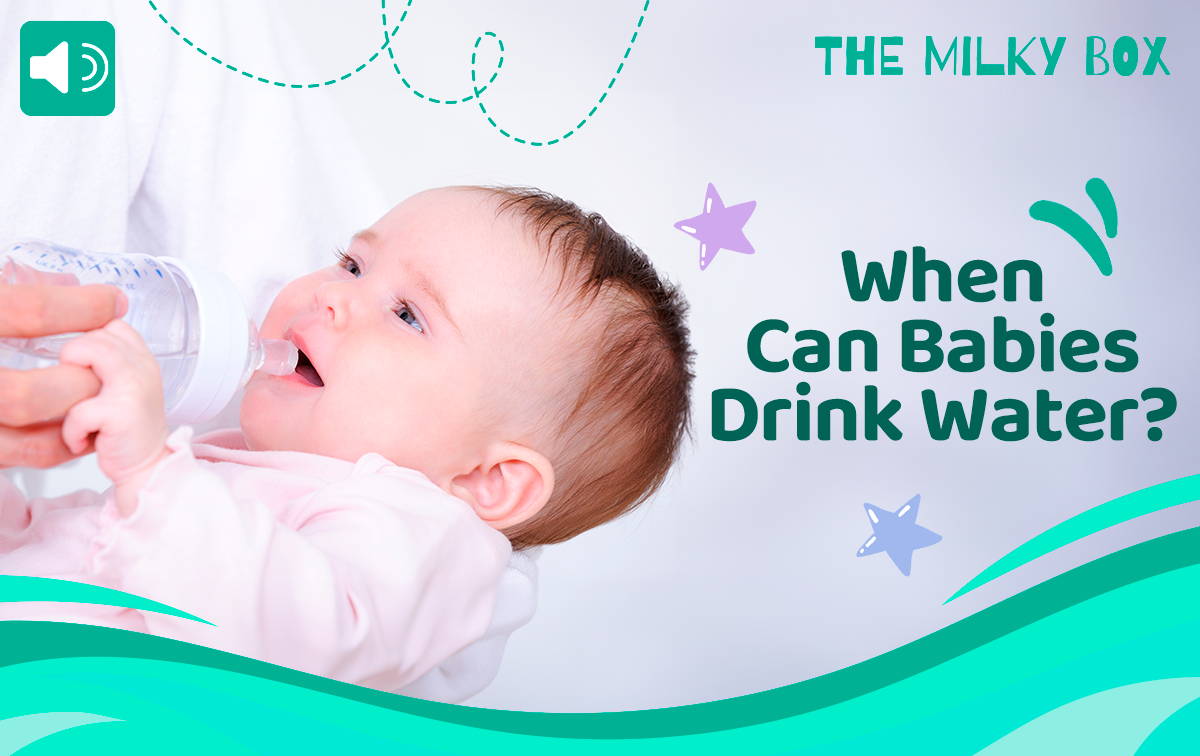
As your baby grows each month, you may question whether breast milk or your chosen alternative is enough or if it's time to introduce water to their diet. It is important to note that while getting enough water daily is crucial for physical health and mental clarity, this may not be necessary for babies under six months of age.
In this article, we will take a closer look at the guidelines for when it is time for infants to drink water.
Table of Contents:
1. When Can I Introduce Water to My Baby?
2. Why Can't Very Young Babies Drink Water?
3. Risks of Giving Baby Water Too Early
4. How Much Water Can My Baby Drink?
5. When Should I Introduce a Cup?
6. How Do I Know if a Baby is Drinking Enough Water?
7. How Much Water Do Babies Need to Stay Hydrated?
9. Is Tap Water Bad for Babies?
10. Can Babies Drink Something Other than Water, Like Juice or Tea?
11. How to Safely Prepare Baby Formula with Water
12. Frequently Asked Questions
When Can I Introduce Water to My Baby?
Let's begin with what we know: During the initial six months of your baby's life, breastmilk, formula, or a combination of both are the only necessary liquids required. In most cases, this will also be sufficient nutrition for your baby.

Why Can't Very Young Babies Drink Water?
It is crucial to avoid giving your baby water during this time as it can disrupt the balance of necessary nutrients and components. Additionally, it's essential to exercise caution when mixing formula powder - overdiluting or adding excessive water can be dangerous and even fatal. So, it's best to follow the recommended concentration carefully.
Risks of Giving Baby Water Too Early
For healthy adults, drinking plain and pure water is the best way to satisfy their thirst. It is recommended that adults consume 8-12 eight-ounce glasses of water each day for their overall well-being.
However, it is essential to note that too much water can be dangerous for children under one, particularly during their first six months of life. Medical organizations such as WHO and UNICEF warn that excessive water intake can dilute a baby's sodium levels, leading to seizures, coma, brain damage, and even death.
Healthy babies don't have to consume additional water besides breast milk or formula. Water should be limited for older babies and given only after breastfeeding or formula.
Always check with your pediatrician to ensure the readiness of water introduction and the amount to be given. Of course, if any problematic symptoms are associated with adding water, get help immediately.
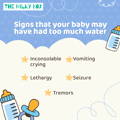
How Much Water Can My Baby Drink?
After consulting with your medical provider, your little one may be ready to start drinking water after six months. It is essential to always prioritize safety during this milestone.
Ensuring that the amount of water given is appropriate for their age and stage of development is crucial in maintaining proper nutrition. Striking a delicate balance is vital.
When Should I Introduce a Cup?
Introducing water to your baby when starting a solid food diet is recommended. However, it is essential to note that baby formula or breast milk should still be the primary source of hydration and nutrition.
Giving water to your baby at this stage can help prevent constipation, but it is essential to be aware that as their gut flora changes and develops while digesting solid food for the first time, it can become a problem. Fortunately, a baby's kidneys are more developed at around six months old, reducing the risk of water intoxication.
Toddler Cups
Introducing a cup is a wonderful way to have water available from the beginning. Using a natural cup or a sippy cup at the dinner table when your child can sit up will help to develop mouth muscles and improve fine motor skills and coordination.
How Do I Know if a Baby is Drinking Enough Water?
The amount of water your baby can consume varies based on their age and the development of their bodily systems.
As your little one's kidneys mature, they become better equipped to handle water added daily. However, it is essential not to exceed the recommended daily amount, as this can lead to water intoxication and put your baby's health at risk.
Additionally, it is important to remember that water should never be used as a substitute for your baby's breast milk or infant formula.
How Much Water Do Babies Need to Stay Hydrated?
The amount of water to establish in your babies’ daily routine depends on their age. At six months, a baby’s appropriate amount of water is 4 to 8 ounces daily.
Significantly, this limit should not be exceeded; otherwise, you put your baby at risk of water intoxication. Water is unsuitable for replacing your baby's breast milk and can’t be considered an alternative to mothers’ milk.
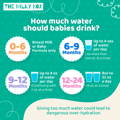
It is important to remember that babies only need to drink water once they are six months old unless it is required for mixing with powdered formula. After six months, gradually introducing water in small amounts is suggested and, in some cases, beneficial.
Choosing Organic Baby Formulas for Hydration
Breast milk or formula is the primary source of nutrition and hydration for babies before they are six months old. Therefore, selecting high-quality baby formula is of utmost importance.
Many parents choose European organic baby formulas during this critical period. These formulas provide essential nutrition to ensure your baby receives optimal nourishment for healthy growth and development.

Can Baby Get Dehydrated?
If your baby is breast or bottle-appropriately fed and their pediatrician approves of their growth and development, a lack of water won't cause dehydration. However, dehydration is more likely to occur if your little one is experiencing health problems such as a cold, flu, or other illnesses.
If feeding is interrupted or they lose fluids due to vomiting or diarrhea, your baby may become dehydrated. If your baby has a fever or is in a hot environment, it may be advisable to add small amounts of water by spoon under medical supervision.
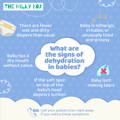
If dehydration is a concern for your baby, we suggest offering the breast or bottle more frequently. Additionally, it is advisable to consult your pediatrician or qualified holistic practitioner regarding using an electrolyte solution like Pedialyte.
Is Tap Water Bad for Babies?
Whether families mix water into powdered formula or allow little ones to take small sips once they reach six months, the type of water you use can matter. In many areas, you may prefer a bottle of tap.
Tap
To ensure safety, it is recommended to use cold tap water instead of hot water from the faucet, as hot water contains more lead. Installing a filtration system in your home can benefit the health of your entire family, including your baby's immune system. Without a filtration system, boiling cold tap water is a viable option to purify water for mixing baby formula.
Distilled Bottled Water
Distillation is a purification method that boils liquid into vapor and condenses it into purified water. The process removes harmful contaminants as well as natural minerals. Experts recommend Bottled Water when it is labeled as sterile and does not contain elevated levels of sulfate or sodium.
Can Babies Drink Something Other than Water, Like Juice or Tea?
Juice or tea are not listed in the US or EU as recommended drinks for infants and children. Children should not drink fruit or vegetable juice before 12 months of age due to the high sugar levels.
After 12 months, when solid nutrition is better established, families can introduce their little one to 4 ounces or less of 100% fruit juice. All caffeinated drinks should be avoided as young children have no established safe limit.
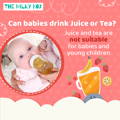
How to Safely Prepare Baby Formula with Water
When introducing water or any nutrition to your baby, their health and safety should be your top priority. The Milky Box only offers breastmilk alternatives from well-known, trusted brands to ensure your baby's well-being.
Our European baby formulas are made with pure and clean ingredients designed to support your infant from their first day to weaning.
Frequently Asked Questions
What Should You Do If You Think Your Baby is Dehydrated?
When Can Babies Drink Water?
If your baby is over six months old, you can offer small amounts of boiled and cooled tap water, but you should not replace their breast milk or formula.
Can Babies Under 6 Months Have Water?
Babies under six months of age should not consume water. They meet their fluid needs in other ways, such as breast milk or formula.
Do Breastfeeding Babies Need More Water than Formula Fed Babies?
No. Breast milk is about 87% water, and European baby formulas are regulated and made to mimic breast milk.
Disclaimer:
Please be aware that this information is based on general trends in babies, and it is not medical advice. Your doctor should be your first source of information and advice when considering any changes to your child’s formula and when choosing your child’s formula. Always consult your pediatrician before making any decisions about your child’s diet or if you notice any changes in your child.
Breastfeeding is the best nutrition for your baby because breast milk provides your child with all the essential nutrients they need for growth and development. Please consult your pediatrician if your child requires supplemental feeding.

Suzanne Renee' is an accomplished professional with extensive expertise in the area of infant nutrition, dedicated to promoting the health and wellbeing of children. She started this journey as a foster parent. Suzanne has emerged as a strong proponent of the European baby formula and has become a full time writer of the subject. In her free time, she enjoys camping, hiking and going to church.
Read Next:
Reviewed by Dr. Eric Wood, ND, MA

Dr. Wood is a licensed naturopathic doctor, with a doctorate degree from the Canadian College of Naturopathic Medicine in Toronto, Canada. He received his post-graduation certification in Mind Body Medicine at Harvard University.
With 15 years of experience, Dr. Wood is an Associate Professor of Holistic Nutrition at the American College of Health Sciences in Portland, Oregon. Dr. Wood is an educator, clinician, author, media figure, consultant, and owns his own holistic (naturopathic) medical practice in Ft. Lauderdale, Florida. Dr. Wood is currently researching and drafting books on cancer and pediatrics.
Outside of the medical profession, Dr. Wood loves singing with the Miami Lyric Opera and is an avid musician in South Florida. He also loves spending time with his wife and kids.

